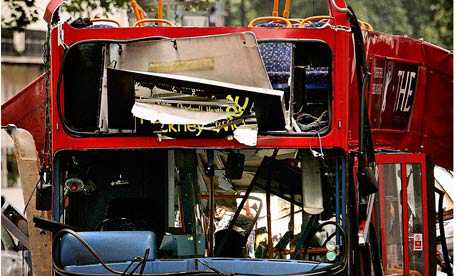MI5 and police failures under spotlight in London bomb inquests
Allegations of flawed intelligence before 7/7 suicide attacks to be investigated by coroner without jury
Richard Norton-Taylor

Inquests into the deaths of 52 people in the 7 July London suicide bombings will investigate alleged failings of MI5 and the police before the attacks, a coroner decided today in a ruling that received a mixed response from relatives.
Lady Justice Hallett said the inquests, due to start in October, would include the “alleged intelligence failings and the immediate aftermath of the bombings” and would be heard without a jury. Survivors would have a limited role but the inquests into the deaths of the four bombers would not be held at the same time.
She said: “It is not too remote to investigate what was known in the year or two before the alleged bombings. Plots of this kind are not developed overnight.” As far as the parliamentary intelligence and security committee (ISC) was concerned: “Whatever its good intentions, it could not fulfil the role of independent investigator.”
She added: “There may be practical difficulties in doing more, it may take sometime, but it is a counsel of defeat to say the difficulties cannot be overcome before one has even embarked upon the task.”
The coroner, who is also an appeal court judge, argued that because of the sensitivity of the intelligence surrounding the bombers, “my sitting with a lay jury without security clearance would inhibit a full and fearless investigation“.
MI5’s lawyers argued that if its intelligence was disclosed, al-Qaida would be handed an “invaluable weapon”.
MI5 told the ISC that though two of the suicide bombers – Mohammad Sidique Khan and Shehzad Tanweer – had been on its radar, specifically by talking to known terror suspects, their identities were not known at the time. The evidence was they may have been involved in fraud, not planning terror plots.
MI5 also argued that they did not have enough resources to follow individuals considered less dangerous than others.
Some of those affected by the attacks said they were disappointed not to be granted a special status to question witnesses. Instead, they or their lawyers could suggest lines of inquiry in what Hallett called a “valuable role”. Their solicitor Clifford Tibber said he would not rule out appealing against the coroner’s decision.
Jacqui Putnam, who survived the attack at Edgware Road, said: “Our role now will be one of answering questions, which we will do, but our questions are not going to be answered.
“Once again we have been shunted aside by officialdom and those questions may or may not be answered. They need to be answered because they involve the safety of everyone on public transport.”
Janine Mitchell, whose husband Paul survived the King’s Cross explosion, said the inquests would be a chance to examine the work of MI5. She said: “We have been campaigning for a very long time now for an inquiry, we are just ordinary people caught up in an atrocity.”
The bombers – Khan, 30, Tanweer, 22, Hasib Hussain, 18, and Jermaine Lindsay, 19 – met at Luton station and took a train to King’s Cross in London.
Tanweer detonated his bomb at Aldgate, Khan at Edgware Road. Lindsay blew himself up between King’s Cross and Russell Square and Hussain detonated his device on a bus at Tavistock Square. As well as killing themselves and 52 others, they injured more than 700 people.
https://www.theguardian.com/uk/2010/may/21/mi5-police-failures-london-bomb, 21 May 2010

Leave a Reply